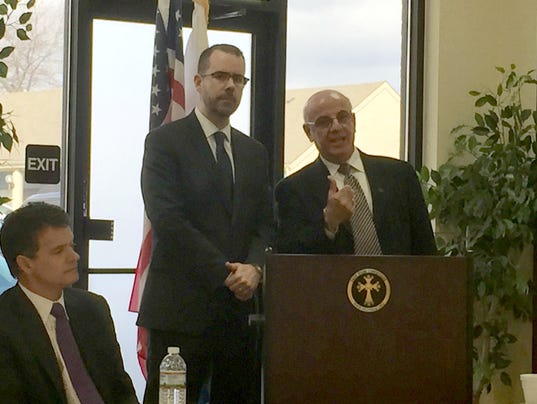Protect imperiled minorities in Iraq, U.S. State Dept. official told
 Niraj Warikoo, Detroit Free Press
Niraj Warikoo, Detroit Free Press
State Department official who advises on religious freedom visits metro Detroit to hear concerns from Iraqi-Americans about the plight of minorities in Iraq.
(Photo: Niraj Warikoo Detroit Free Press)
Iraqi-Americans told a State Department official visiting metro Detroit on Friday that the U.S. government needs to take action soon to help preserve minorities in Iraq facing cultural extinction.
Knox Thames, the U.S. State Department’s special adviser for religious minorities in the Middle East and south and central Asia, visited three Iraqi-American Christian centers and an Arab church in metro Detroit led by a Syrian-American priest.
“We need the U.S. State Department and other departments to help us,” Joseph Kassab, founder and president of the Iraqi Christians Advocacy and Empowerment Institute in West Bloomfield, said at a meeting Friday at the institute’s office with Thames and 35 Iraqi-American leaders. “Religious freedom is falling through the cracks. The radical terrorism is on the rise, not only in the Middle East, but now it’s creeping to Europe and even to North America. We are very worried about that.”
Thames said the U.S. is committed to helping protect religious minorities in Iraq and other parts of the Middle East, where many are facing persecution from extremists. On Thursday, Secretary of State John Kerry declared that ISIS is committing genocide against Yazidis, Christians and Shias, the first time the U.S. has used that word to describe a group’s actions since 2004.
Thames’ trip to metro Detroit was planned before the genocide designation, but the timing shows the administration’s concern over the issue, he said. Thames was appointed by the State Department in September to the newly created position of protecting religious freedom in the Middle East and South Asian regions.
“It’s going to be very difficult” to defeat ISIS and protect minorities, Thames told the group of Iraqi-American leaders. “The challenges are immense, but Daesh (another acronym for ISIS) will be defeated one day.”
In response, Nabil Roumayah of the Iraqi Democratic Union in Southfield, said: “That’s too long.”
“One day’ is too far,” Roumayah said. “We need it now.”
Roumayah said the U.S. needs to tell Saudi Arabia, Turkey, and Iran to stop financing extremist groups in Iraq.
“They are both your friends,” Roumayah said of Turkey and Saudi Arabia.
The U.S. also needs to put pressure on Iraq’s government to be secular and respect religious minorities, Roumayah said.
In addition to Christians, the meeting in West Bloomfield included Mandeans and Yazidis, two religious minorities facing extinction in Iraq. Thames said that he and other officials visited the Yazidi equivalent of the Vatican. The plight of Yazidis is “deeply concerning,” said Thames. He hopes that trust can be restored between Yazidis and the Kurdish military, whom some Yazidis say failed to protect them from ISIS.
Thames also visited the Chaldean Community Foundation in Sterling Heights; St. Mary Antiochian Orthodox Church in Livonia, where he met with its religious leader, Fr. George Shalhoub, a native of Syria; and the Shenandoah Country Club in West Bloomfield, a Chaldean center.
“We expressed our frustration and requested the U.S. immediately help establish an internationally protected safe zone to protect the Chaldeans and other minorities in Iraq and Syria,” said Martin Manna, head of the Chaldean Chamber of Commerce in metro Detroit, of the meeting in Sterling Heights with Chaldean leaders. “We also inquired about when Mosul will be liberated.”
Many Iraqi-American Christians in metro Detroit have roots in the Mosul area of Iraq, currently under the control of ISIS.
Manna and others expressed concern that the U.S. is letting in smaller numbers of Iraqi refugees and that religious minorities from Syria and Iraq are being admitted in smaller numbers than to Muslims.
Thames said during the West Bloomfield meeting that about 38% of Iraqi refugees admitted into the U.S. are Christians, with an additional 2% from other non-Muslim minority groups in Iraq.
Iraqi-Americans at the meeting said that family members in Iraq were pleased about the genocide designation, hoping it will lead to action.
“When will this be implemented?” asked Abed Francis of West Bloomfield, a member of the Chaldean Assyrian Syriac Popular Council.
The U.S. has an “obligation to act,” he said. Unless the U.S. acts soon, the end could be near for minorities in Iraq, who have lived there for thousands of years.
“Time is our enemy.”
http://www.freep.com/story/news/local/michigan/2016/03/18/iraqi-americans-ask-fed-official-protect-minorities/81986922/
